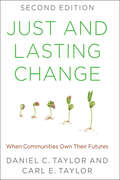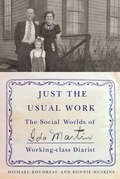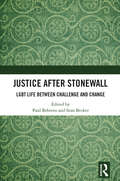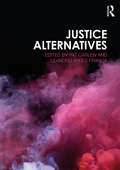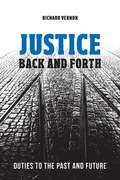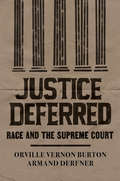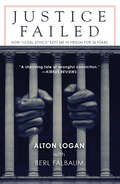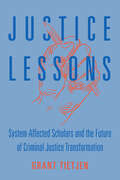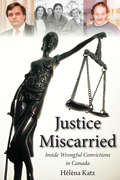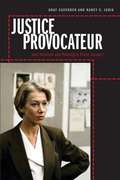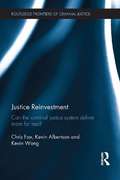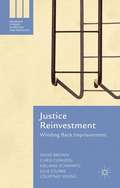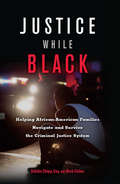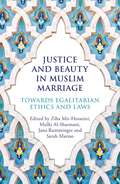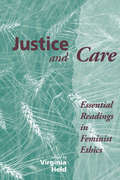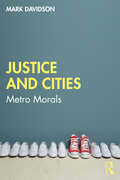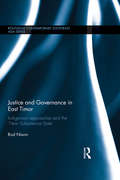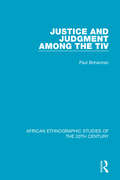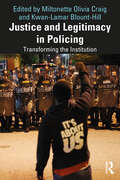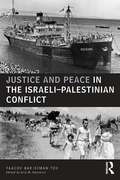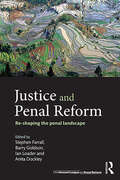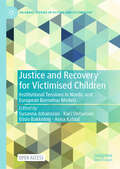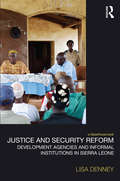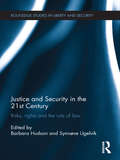- Table View
- List View
Just and Lasting Change: When Communities Own Their Futures
by Daniel C. Taylor Carl E. TaylorThis revised and updated guide presents a proven method for policy and health professionals to promote community-based progress in developing nations. Daniel C. and Carl E. Taylor built their decades-long careers by partnering with key thinkers to combat inequity, environmental degradation, and globalization. Their innovative SEED-SCALE model enables people to transform their communities by analyzing their local context in relation to the global, taking appropriate actions based on their priorities and resources, and assessing what next steps may be needed for continuing progress.Just and Lasting Change describes, step by step, how the SEED-SCALE model can be effectively implemented. Drawing from a variety of personal experiences and case studies, the authors describe historical attempts to promote social development, as well as current efforts in South America, Africa, and Asia. This wide-ranging book touches on examples of community-based change from Abraham Lincoln&’s leadership style to the Green Bay Packers&’s ownership model. It also explores thematic global examples from the anti-smoking campaign, Green Revolution, Child Survival Revolution, and urban agriculture. This second edition is fully revised and updated with: Five completely new chapters Thirteen years of scholarship and global evidence New contributions from leading international experts in community-based development and public health
Just around Midnight
by Jack HamiltonWhen Jimi Hendrix died, the idea of a black man playing lead guitar in a rock band seemed exotic. Yet ten years earlier, Chuck Berry had stood among the most influential rock and roll performers. Why did rock and roll become white? Jack Hamilton challenges the racial categories that distort standard histories of rock music and the 60s revolution.
Just the Usual Work: The Social Worlds of Ida Martin, Working-Class Diarist
by Michael Boudreau Bonnie HuskinsBorn in 1907, Ida Martin spent most of her life in Saint John, New Brunswick. She married a longshoreman named Allan Robert Martin in 1932 and they had one daughter. In the years that followed, Ida had a busy and varied life, full of work, caring for her family, and living her faith. Through it all, Ida found time to keep a daily diary from 1945 to 1992.Bonnie Huskins is Ida Martin's granddaughter. In Just the Usual Work, she and Michael Boudreau draw on Ida's diaries, family memories, and the history of Atlantic Canada to shed light on the everyday life of a working-class housewife during a period of significant social and political change. They examine Ida's observations about the struggles of making ends meet on a longshoreman's salary, the labour confrontations at the Port of Saint John, the role of automobiles in the family economy, the importance of family, faith, and political engagement, and her experience of widowhood and growing old.Ida Martin's diaries were often read by members of her family to reconstruct and relive their shared histories. By sharing the pages of her diaries with a wider audience, Just the Usual Work keeps Ida's memory alive while continuing her abiding commitment to documenting the past and finding meaning in the rhythms of everyday life.
Justice After Stonewall: LGBT Life Between Challenge and Change
by Paul Behrens Sean BeckerJustice After Stonewall is an interdisciplinary analysis of challenges and progress experienced by the LGBT community since the Stonewall riots in 1969. The riots (sparked by a police raid in New York City) are a milestone in LGBT history. Within a short time, a new feeling of confidence emerged, manifested in new LGBT organisations and the first Pride marches. Legal and social change followed: from the decriminalisation of homosexual activities to anti-discrimination laws and the legalisation of same-sex marriage. This makes it tempting to think of modern LGBT history as an unequivocal success story. But progress was not achieved everywhere: in 70 States, same-sex relations are still criminalised; violence against LGBT persons still occurs, and transgender people still struggle to have their rights recognised. The question whether the path since Stonewall represents success or failure cannot be answered by one discipline alone. This book breaks new ground by bringing together experts from politics, sociology, law, education, language, medicine and religion to discuss fields as diverse as same-sex marriage, transgender students, the LGBT movement in Uganda and LGBT migrants in the Arabian Peninsula, conversion 'therapy', and approaches to LGBT matters in Judaism, Christianity and Islam. What emerges is a rich tapestry of LGBT life today and its consideration from numerous perspectives. Based on thorough research, this book is an ideal text for students and scholars exploring LGBT matters. At the same time, its engaging style makes it a particularly valuable resource for anyone with an interest in LGBT matters and their reception in today's world.
Justice Alternatives
by Pat Carlen Leandro Ayres FrançaJustice is one of the most debated and reinterpreted of concepts within the fields of law, criminology and criminal justice. Bringing together 35 leading thinkers, analysts and campaigners from around the world, this collection presents a range of on-going struggles for justice from abolitionist, transitional, transformative, indigenous, green and restorative perspectives. Against a background of contemporary concerns about dark money, plutocracies and populism, these chapters raise questions about the relationships between social justice and criminal justice and between democracy, knowledge and justice. Overall, the chapters also demonstrate the breadth, variety and vibrancy of contemporary criminology and include, amongst other cutting-edge contributions, chapters by John Braithwaite, Michelle Brown, Ian Loader, Pat O’Malley, Joe Sim, Susanne Karstedt, Phil Scraton, Richard Sparks, Loïc Wacquant and Sandra Walklate. Justice Alternatives is essential reading for students of criminology, criminal justice and law, as well as for other scholars and activists concerned about social justice, policing, courts, imprisonment, mass supervision, rights and privatized justice. The book’s emphasis upon the importance of imagination, experimentation, innovation and debate aims to promote an optimism that there are always alternatives to inequality, domination and oppression.
Justice Back and Forth: Duties to the Past and Future
by Richard VernonIdeas of justice have traditionally focused on what individuals owe to one another and have drawn our attention to what is considered fair - what one of us owes to another is justly matched by what the other owes to them. However, what does justice require us to do for past and future generations?In Justice Back and Forth, award-winning author Richard Vernon explores the possibility of justice in cases where time makes reciprocity impossible. This "temporal justice" is examined in ten controversial cases including the duty to return historical artifacts, the ethics and politics of parenting, the punishment of historical offences, the right to procreate, and the imposition of constitutions on future citizens. By deftly weaving together discussions on historical redress and justice for future generations, Vernon reveals that these two opposing topics can in fact be used to illuminate each other. In doing so, he concludes that reciprocity can be adapted to serve intergenerational cases.
Justice Deferred: Race and the Supreme Court
by Orville Vernon Burton Armand DerfnerIn the first comprehensive accounting of the U.S. Supreme Court’s race-related jurisprudence, a distinguished historian and renowned civil rights lawyer scrutinize a legacy too often blighted by racial injustice. The Supreme Court is usually seen as protector of our liberties: it ended segregation, was a guarantor of fair trials, and safeguarded free speech and the vote. But this narrative derives mostly from a short period, from the 1930s to the early 1970s. Before then, the Court spent a century largely ignoring or suppressing basic rights, while the fifty years since 1970 have witnessed a mostly accelerating retreat from racial justice. From the Cherokee Trail of Tears to Brown v. Board of Education to the dismantling of the Voting Rights Act, historian Orville Vernon Burton and civil rights lawyer Armand Derfner shine a powerful light on the Court’s race record—a legacy at times uplifting, but more often distressing and sometimes disgraceful. For nearly a century, the Court ensured that the nineteenth-century Reconstruction amendments would not truly free and enfranchise African Americans. And the twenty-first century has seen a steady erosion of commitments to enforcing hard-won rights. Justice Deferred is the first book that comprehensively charts the Court’s race jurisprudence. Addressing nearly two hundred cases involving America’s racial minorities, the authors probe the parties involved, the justices’ reasoning, and the impact of individual rulings. We learn of heroes such as Thurgood Marshall; villains, including Roger Taney; and enigmas like Oliver Wendell Holmes and Hugo Black. Much of the fragility of civil rights in America is due to the Supreme Court, but as this sweeping history also reminds us, the justices still have the power to make good on the country’s promise of equal rights for all.
Justice Failed: How "Legal Ethics" Kept Me in Prison for 26 Years
by Alton Logan Berl Falbaum“A shocking tale of wrongful conviction . . . that brings general conditions into cruelly sharp focus.” —Kirkus ReviewsJustice Failed is the story of Alton Logan, an African American man who served twenty–six years in prison for a murder he did not commit. In 1983, Logan was falsely convicted of fatally shooting an off–duty Cook County corrections officer, Lloyd M. Wickliffe, at a Chicago–area McDonald’s, and sentenced to life in prison. While serving time for unrelated charges, Andrew Wilson—the true murderer—admitted his guilt to his own lawyers, Dale Coventry and Jamie Kunz. However, bound by the legal code of ethics known as the absolutism of client–attorney privilege, Coventry and Kunz could not take action. Instead, they signed an affidavit proclaiming Logan’s innocence and locked the document in a hidden strong box. It wasn’t until after Wilson’s death in 2007 that his lawyers were able to come forward with the evidence that would eventually set Alton Logan free after twenty–six years in prison.Written in collaboration with veteran journalist Berl Falbaum, Justice Failed explores the sharp divide that exists between commonsense morality—an innocent man should be free—and the rigid ethics of the law that superseded that morality. Throughout the book, in–depth interviews and legal analyses give way to Alton Logan himself as he tells his own story, from his childhood in Chicago to the devastating impact that the loss of a quarter century has had on his life—he entered prison at twenty–eight years of age, and was released at fifty–five.
Justice Lessons: System-Affected Scholars and the Future of Criminal Justice Transformation
by Grant E. TietjenSince the 1990s, the community of scholar-activists who have had contact with the criminal legal system has grown rapidly, solidifying into an international movement. Drawing on in-depth conversations with system-affected academics as well as his own experience with incarceration, Grant E. Tietjen traces the history, positive impacts, and future promise of this movement. By offering networks of support to system-affected people seeking higher education and using the perspectives afforded them by their lived experiences to push their disciplines forward, the movement effects reciprocal changes between the individual and the entire institution of higher education. These changes, Tietjen argues, ripple outward and stand to contribute to the wider movement against carceral responses to harm.
Justice Miscarried
by Helena KatzFormer bank manager Ronald Dalton never got to watch his three young children grow up. In 1989 he was convicted for a crime that never happened. His wife, Brenda, was later ruled to have choked to death on breakfast cereal not strangled as a pathologist had initially claimed. Dalton’s daughter, Alison, was in kindergarten when he was charged with second-degree murder in 1988. He attended her high school graduation on June 26, 2000, two days after his conviction was finally overturned. <p><p> Behind the proud facade of Canada’s criminal justice system lie the shattered lives of the people unjustly caught within its web. Justice Miscarried tells the heartwrenching stories of twelve innocent Canadians, including David Milgaard, Donald Marshall, Guy Paul Morin, Clayton Johnson, William Mullins-Johnson, and Thomas Sophonow, who were wrongly convicted and the errors in the nations justice system that changed their lives forever.
Justice Provocateur: Jane Tennison and Policing in Prime Suspect
by Gray Cavender Nancy C. JurikJustice Provocateur focuses on Prime Suspect, a popular British television film series starring Oscar and Emmy award-winning actress Helen Mirren as fictional London policewoman Jane Tennison. Gray Cavender and Nancy C. Jurik examine the media constructions of justice, gender, and police work in the show, exploring its progressive treatment of contemporary social problems in which women are central protagonists. They argue that the show acts as a vehicle for progressive moral fiction--fiction that gives voice to victim experiences, locates those experiences within a larger social context, transcends traditional legal definitions of justice for victims, and offers insights into ways that individuals might challenge oppressive social and organizational arrangements. Although Prime Suspect is often seen as a uniquely progressive, feminist-inspired example within the typically more conservative, male-dominated crime genre, Cavender and Jurik also address the complexity of the films' gender politics. Consistent with some significant criticisms of the films, they identify key moments in the series when Tennison's character appears to move from a successful woman who has it all to a post-feminist stereotype of a lonely, aging career woman with no strong family or friendship ties. Shrewdly interpreting the show as an illustration of the tensions and contradictions of women's experiences and their various relations to power, Justice Provocateur provides a framework for interrogating the meanings and implications of justice, gender, and social transformation both on and off the screen.
Justice Reinvestment: Can the Criminal Justice System Deliver More for Less? (Routledge Frontiers of Criminal Justice)
by Chris Fox Kevin Wong Kevin AlbertsonRising prison numbers on both sides of the Atlantic are cause for concern. Justice Reinvestment is a major movement in criminal justice reform in the US that is also attracting lots of interest in the UK. Justice Reinvestment is an approach to addressing the penal crisis that uses the best available evidence to re-direct resources to more effective rehabilitation of offenders and better ‘prehabilitation’. It takes a more holistic view of criminal justice and is particularly concerned to address the community dimensions of offending and re-offending. The authors highlight competing models of Justice Reinvestment and argue for a more radical version in which criminal justice reform is seen as part of a wider social justice reform programme. This is the first substantial publication on Justice Reinvestment and shows that ‘Justice Reinvestment’ has huge potential to re-shape the criminal justice system. It will be essential reading for undergraduate and post-graduate students with an interest in criminal justice reform. Practitioners and policy-makers working in the criminal justice system in the US and the UK will also value the fresh perspective it brings to criminal justice reform and its breadth of coverage including insights into the penal crisis, different models of Justice Reinvestment, the use of criminal justice data and research evidence in re-designing criminal justice services and new approaches to commissioning.
Justice Reinvestment: Winding Back Imprisonment (Palgrave Studies in Prisons and Penology)
by David Brown Courtney Young Chris Cunneen Melanie Schwartz Julie StubbsJustice reinvestment was introduced as a response to mass incarceration and racial disparity in the United States in 2003. This book examines justice reinvestment from its origins, its potential as a mechanism for winding back imprisonment rates, and its portability to Australia, the United Kingdom and beyond. The authors analyze the principles and processes of justice reinvestment, including the early neighborhood focus on 'million dollar blocks'. They further scrutinize the claims of evidence-based and data-driven policy, which have been used in the practical implementation strategies featured in bipartisan legislative criminal justice system reforms. This book takes a comparative approach to justice reinvestment by examining the differences in political, legal and cultural contexts between the United States and Australia in particular. It argues for a community-driven approach, originating in vulnerable Indigenous communities with high imprisonment rates, as part of a more general movement for Indigenous democracy. While supporting a social justice approach, the book confronts significantly the problematic features of the politics of locality and community, the process of criminal justice policy transfer, and rationalist conceptions of policy. It will be essential reading for scholars, students and practitioners of criminal justice and criminal law.
Justice While Black: Helping African-American Families Navigate and Survive the Criminal Justice System
by Nick Chiles Robbin ShippAn essential guide for Black Americans to understanding the criminal justice system, and why it continues to see Black men as targets and as dollar signs.Justice While Black is a must-read for every young Black male in America—and for everyone else who cares about their survival and well-being. The book provides practical, straightforward advice on how to deal with specific legal situations: the threat of arrest, being arrested, being in custody, preparing for and undergoing a trial, and navigating the appeals and parole process. The primary goal of this book is to become a primer for African Americans on how to avoid becoming ensnared in the criminal justice system.While the precarious safety of Black males has received renewed interest in the past year because of the deaths of young men like Daunte Wright and Ryan LeRoux, the fact is that this group has always been under threat from the armed guardians of the White social order. The tactics have been modernized, but the impact is still devastating—we are witnessing an epic criminalization of the African-American community at levels never before seen since the end of slavery.
Justice and Beauty in Muslim Marriage: Towards Egalitarian Ethics and Laws
by Mulki Al-Sharmani Jana Rumminger Ziba Mir-Hosseini Sarah MarssoThe model of marriage constructed in classical Islamic jurisprudence rests on patriarchal ethics that privilege men. This worldview persists in gender norms and family laws in many Muslim contexts, despite reforms introduced over the past few decades. In this volume, a diverse group of scholars explore how egalitarian marital relations can be supported from within Islamic tradition. Brought together by the Musawah movement for equality and justice in the Muslim family, they examine ethics and laws related to marriage and gender relations from the perspective of the Qur&’an, Sunna, Muslim legal tradition, historical practices and contemporary law reform processes. Collectively they conceptualize how Muslim marriages can be grounded in equality, mutual well-being and the core Qur&’anic principles of &‘adl (justice) and ihsan (goodness and beauty).
Justice and Care: Essential Readings in Feminist Ethics
by Virginia Held<p>When feminist philosophers first turned their attention to traditional ethical theory, its almost exclusive emphasis upon justice, rights, abstract rationality, and individual autonomy came under special criticism. Women's experiences seemed to suggest the need for a focus on care, empathetic relations, and the interdependence of persons. <p>The most influential readings of what has become an extremely lively and fruitful debate are reproduced here along with important new contributions by Alison Jaggar and Sara Ruddick. As this volume testifies, there is no agreement on the important questions about the relationship between justice and care, but the debate has deepened and enriched our understanding in many ways.Justice and Care is a valuable collection of readings—an essential tool for anyone studying the state of feminist thought in particular or ethical theory in general.</p>
Justice and Cities: Metro Morals
by Mark DavidsonThis book explores different theories of justice and explains how these connect to broader geographical questions and inform our understanding of urban problems. Since philosophers like Socrates debated in the ancient agora, cities have prompted arguments about the best ways to live together. Cities have also produced some of the most vexing moral problems, including the critical question of what obligations we have to people we neither know nor affiliate with. The first part of this book outlines the most well-developed answers to these questions: the justice theories of Utilitarianism, Libertarianism, Liberalism, Marxism, Communitarianism, Conservativism, and recent "post" critiques. Within each theory, we find a set of geographical propensities that shape the ways purveyors of the theories see the city and its moral problems. The central thesis of the book is therefore that competing moral theories have distinct geographical concerns and perspectives, and that these propensities often condition how the city and its injustices are understood. The second part of the book features three studies of contemporary urban problems – gentrification, segregation, and (un)affordability – to demonstrate how predominant justice theories generate distinctive moral and geographical interpretations. This book therefore serves as an urbanist’s guide to justice theory, written for undergraduates and postgraduates studying human geography, urban and municipal planning, urban theory and urban politics, sociology, and politics and government.
Justice and Governance in East Timor: Indigenous Approaches and the 'New Subsistence State' (Routledge Contemporary Southeast Asia Series)
by Rod NixonFocusing on the case study of Timor Leste, this book presents the New Subsistence State as a conceptual tool for understanding governance challenges in countries characterised by subsistence economic and social relations. It examines the ways in which Timor Leste conforms to the typology of the New Subsistence State, taking into consideration geographic, historical and socio-political aspects. The book defines a New Subsistence State as an overwhelmingly subsistence economy corresponding to little or no historical experience of the generation and administration of large surpluses, with minimal labour specialisation, and the predominance, especially in rural areas, of traditional authority relations. It looks at how these features restrict the capacity of the new state to operate effectively in accordance with the modern state model. The book presents a case for prioritising sustainable approaches to public administration in New Subsistence State contexts. It goes on to examine the historical role of village justice systems, and demonstrates how a community justice and mediation program building on existing capacities could prove an economical means of promoting human rights values and reducing the burden on the national courts. The book presents an interesting contribution to studies on Southeast Asian Politics and Governance.
Justice and Judgment Among the Tiv
by Paul BohannanSince publication in 1957 the importance of Bohannan's study of judicial institutions and procedures among the Tiv has been widely recognized. It has contributed widely to the continuing discussion concerning the objectives and methods to be followed in the anthropological study of law and the contribution this makes to comparative jurisprudence. the work describes and defines Tiv ideas of 'law' as expressed in the operations of their courts known as Jir. The analysis is based on and illustrated by numerous cases which the author attended and discussed with leaders in the Jir.
Justice and Legitimacy in Policing: Transforming the Institution
by Miltonette Olivia Craig and Kwan-Lamar Blount-HillJustice and Legitimacy in Policing critically analyzes the state of American policing and evaluates proposed solutions to reform/transform the institution, such as implementing body-worn cameras, increasing diversity in police agencies, the problem of crimmigration, limiting qualified immunity, and the abolitionist movement. Considering the changes that have occurred in our socio-political climate, policymakers, scholars, and the public are in need of a book that focuses on the American policing institution in a comprehensive yet critical manner. Each chapter is devoted to a specific area of policing that has either received criticism for the problems it may create or has been proposed to effect reform. The chapters are sequenced such that readers are introduced to a spectrum of topics to expand the discourse on changes needed to achieve equitable policing. The book also encourages readers to consider the idea that achieving justice and legitimacy in policing cannot happen as the institution is now formulated, and it invites readers to use the topics discussed in each chapter to envision transformative propositions. Justice and Legitimacy in Policing is intended to engage policymakers and practitioners as well as interested members of the public. The scope of this book also makes it a valuable resource for academics and students.
Justice and Peace in the Israeli-Palestinian Conflict (UCLA Center for Middle East Development (CMED) series)
by Yaacov Bar Siman TovIn this book, the late Prof. Yaacov Bar-Siman-Tov argues that the failure of the Israeli-Palestinian peace process so far has been mainly the result of the inability of both sides to reach an agreed formula for linking justice to peace. The issues of justice and injustice are focused mainly on the outcomes of the 1947-1949 first Arab-Israeli War and specifically in the creation of the Palestinian refugee problem. The conflicting historical narratives of the two sides regarding the question of responsibility for the injustice done to the Palestinians turn the Israeli-Palestinian conflict into a classic case of linking the issues of justice and peace.Yaacov Bar-Siman-Tov maintains that the narratives of justice and injustice in the Israeli-Palestinian conflict have proved to be formidable barriers to peace. Hence, he recommends that justice should be compromised for the sake of peace. The link between justice and peace is an important issue requiring both sides’ attention, but, given the wide and currently unbridgeable gap separating the two sides, it should be postponed to the phase of reconciliation rather than being included in the process of conflict resolution. The two-state solution is endorsed as the best and practical solution and as a first step for a "just peace" in this conflict, to be followed by reconciliation. Highly topical, this book is essential reading for scholars and researchers of International Relations, Peace Studies and the Arab-Israeli conflict.
Justice and Penal Reform: Re-shaping the Penal Landscape
by Barry Goldson Ian Loader Stephen Farrall Anita DockleyIn the aftermath of the financial crisis of 2008, Western societies entered a climate of austerity which has limited the penal expansion experienced in the US, UK and elsewhere over recent decades. These altered conditions have led to introspection and new thinking on punishment even among those on the political right who were previously champions of the punitive turn. This volume brings together a group of international leading scholars with a shared interest in using this opportunity to encourage new avenues of reform in the penal sphere. Justice is a famously contested concept and this book takes a deliberately capacious approach to the question of how justice can be mobilised to inform new reform agendas. Some of the contributors revisit an antique question in penal theory and reconsider the question of what fair or just punishment should look like today. Others seek to make gender central to understanding of crime and punishment, or actively reflect on the part that related concepts such as human rights, legitimacy and trust can and should play in thinking about the creation of more just crime control arrangements. Faced with the expansive penal developments of recent decades, much research and commentary about crime control has been gloom-laden and dystopian. By contrast, this volume seeks to contribute to a more constructive sensibility in the social analysis of penality: one that is worldly, hopeful and actively engaged in thinking about how to create more just penal arrangements. Justice and Penal Reform is a key resource for academics and as a supplementary text for students undertaking courses on punishment, penology, prisons, criminal justice and public policy. This book approaches penal reform from an international perspective and offers a fresh and diverse approach within an established field.
Justice and Recovery for Victimised Children: Institutional Tensions in Nordic and European Barnahus Models (Palgrave Studies in Victims and Victimology)
by Susanna Johansson Kari Stefansen Elisiv Bakketeig Anna KaldalThis open access book contributes to ongoing discussions about how societies should respond to children who have experienced violence and abuse by delving into the Barnahus model: a multidisciplinary and co-located model whose aim is to provide both justice and recovery to victimised children. The promising model was first implemented in the Nordic region and is currently being diffused across Europe, although scientific knowledge about the model remains scarce: the Barnahus model’s potential for delivering holistic services, the various tensions and dilemmas involved in the model, and how dual mandate of Barnahus can be managed all require further research. Continuing from the volume Collaborating Against Child Abuse (2017) which examined the process of Barnahus’ diffusion in the Nordic countries, the current book digs deeper into the intrinsic institutional tensions of the model, as well as those that might arise during collaboration, in order to advance our understanding of what can be achieved through the model and thus improve the situation of child victims of violence and abuse. An institutional perspective is used in the book which is structured in four parts. The first three parts explore different types of institutional tensions –legal, organisational, and professional-ethical, while the fourth focuses on how these tensions may be balanced. The book’s authors chart this new phase in the diffusion and translation of the Barnahus model. Their analyses will provide valuable guidance to countries that are currently considering or are already implementing the model.
Justice and Security Reform: Development Agencies and Informal Institutions in Sierra Leone (Law, Development and Globalization)
by Lisa DenneyJustice and Security Reform: Development Agencies and Informal Institutions in Sierra Leone undertakes a deep contextual analysis of the reform of the country’s security and justice sectors since the end of the civil war in 2002. Arguing that the political and bureaucratic nature of development agencies leads to a lack of engagement with informal institutions, this book examines the challenges of sustainably transforming security and justice in fragile states. Through the analysis of a post-conflict context often held up as an example of successful peacebuilding, Lisa Denney reveals how the politics of development agencies is an often forgotten constraint in security and justice reform and development efforts more broadly. Particularly suited to upper-level undergraduates and postgraduate students, as well as practitioners, this book is relevant to those interested in security and justice reform and statebuilding, as well Sierra Leone’s post-conflict recovery.
Justice and Security in the 21st Century: Risks, Rights and the Rule of Law (Routledge Studies in Liberty and Security)
by Barbara Hudson Synnøve UgelvikThis book examines the question of whether justice or security is the primary virtue of 21st-century society. The issue of enhancing security without undermining justice – managing risk without undermining the rule of law – has always been problematic. However, recent developments such as new counter-terrorism measures, the expanding scope of criminal law, harsher migration control and an increasingly pronounced concern with public safety, have posed new challenges. The key element of these contemporary challenges is that of membership and exclusion: that is, who is to be included within the community of justice, and against whom is the just community aiming to defend itself? Justice and Security in the 21st Century brings together researchers from various academic disciplines and different countries in order to explore these developments. It attempts to chart the complex landscapes of justice, human rights and the rule of law in an era when such ideals are challenged by increasing demands for efficiency, effectiveness, public safety and security. This edited volume will be of much interest to students of critical legal studies, criminology, critical security studies, human rights, sociology and IR in general.
